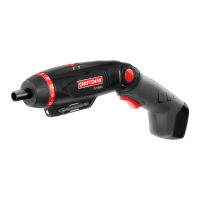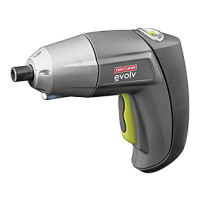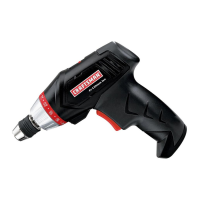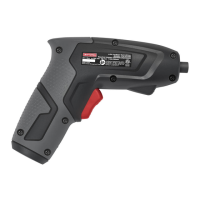5
ENGLISH
BATTERY AND CHARGER
The battery is not fully charged out of the carton. Before using
the charger to charge the battery, read the safety instructions
below and then follow charging proceduresoutlined.
n .........................rated speed
PSI....................... pounds per square
inch
......................earthing terminal
.....................safety alert symbol
.....................visible radiation
..................... wear respiratory
protection
..................... wear eye protection
..................... wear hearing
protection
..................... read all
documentation
The label on your tool may include the following symbols. The
symbols and their definitions are asfollows:
V ......................... volts
Hz .......................hertz
min ..................... minutes
or DC ......direct current
...................... Class I Construction
(grounded)
…/min ..............per minute
BPM .................... beats per minute
IPM ..................... impacts per minute
OPM .................... oscillations per
minute
RPM .................... revolutions per
minute
sfpm ................... surface feet per
minute
SPM .................... strokes per minute
A ......................... amperes
W ........................watts
Wh ......................watt hours
Ah ....................... amp hours
or AC ...........alternating current
or AC/DC .... alternating or direct
current
...................... Class II Construction
(double insulated)
n
o
.......................no load speed
Additional Safety Information
WARNING: Never modify the power tool or any part of
it. Damage or personal injury couldresult.
WARNING: ALWAYS use safety glasses. Everyday
eyeglasses are NOT safety glasses. Also use face or
dust mask if cutting operation is dusty. ALWAYS WEAR
CERTIFIED SAFETYEQUIPMENT:
• ANSI Z87.1 eye protection (CAN/CSA Z94.3),
• ANSI S12.6 (S3.19) hearing protection,
• NIOSH/OSHA/MSHA respiratoryprotection.
WARNING:
Some dust created by power sanding,
sawing, grinding, drilling, and other construction activities
contains chemicals known to the State of California to
cause cancer, birth defects or other reproductive harm.
Some examples of these chemicalsare:
• lead from lead‑based paints,
• crystalline silica from bricks and cement and other
masonry products, and
• arsenic and chromium from
chemically‑treatedlumber.
Your risk from these exposures varies, depending on
how often you do this type of work. To reduce your
exposure to these chemicals: work in a well ventilated
area, and work with approved safety equipment, such
as those dust masks that are specially designed to filter
out microscopicparticles.
• Wear protective clothing and wash exposed areas
with soap and water. Allowing dust to get into your
mouth, eyes, or lay on the skin may promote absorption of
harmfulchemicals. Direct particles away from face andbody.
• Use the appropriate dust extractor vacuum to remove
the vast majority of static and airborne dust. Failure
to remove static and airborne dust could contaminate the
working environment or pose an increased health risk to
the operator and those in closeproximity.
• Use clamps or other practical ways to secure and
support the workpiece to a stable platform. Holding
the work by hand or against your body is unstable and may
lead to loss ofcontrol andinjury.
• Air vents often cover moving parts and should be
avoided. Loose clothes, jewelry or long hair can be caught
in movingparts.
READ ALL INSTRUCTIONS
Important Safety Instructions for All
Integral Battery Tools
WARNING: Read all safety warnings, instructions,
and cautionary markings for the battery, charger
and product. Failure to follow the warnings and
instructions may result in electric shock, fire and/
or seriousinjury.
• NEVER force a charger plug into thetool.
• DO NOT
modify the charger plug of a non‑compatible
charger in any way to fit into the tool as the battery
may rupture causing serious personalinjury.
• DO NOT charge or use the battery in explosive
atmospheres, such as in the presence of flammable
liquids, gases or dust. Inserting or removing the charger
plug from the tool may ignite the dust orfumes.
• Only charge the battery with the providedcharger.
• DO NOT splash or immerse in water or otherliquids.
• DO NOT allow water or any liquid to entertool.
• DO NOT store or use the tool in locations where the
temperature may reach or exceed 104°F (40°C) (such
as outside sheds or metal buildings in summer). For
best life store tools in a cool, drylocation.
NOTE: Do not store the tool with the switch locked on.
Never tape the switch in the ONposition.
• DO NOT incinerate the tool even if it is severely
damaged or is completely worn out. The battery can
explode in a fire. Toxic fumes and materials are created
when lithium‑ion batteries areburned.
• If battery contents come into contact with the skin,
immediately wash area with mild soap and water. If
battery liquid gets into the eye, rinse water over the open
eye for 15minutes or until irritation ceases. If medical
attention is needed, the battery electrolyte is composed of a
mixture of liquid organic carbonates and lithiumsalts.
• Contents of opened battery cells may cause
respiratory irritation. Provide fresh air. If symptoms
persist, seek medicalattention.
• Battery liquid may be flammable if exposed to spark
orflame.
• Never attempt to open the tool for any reason. If the
tool case is cracked or damaged, do not charge. Do
not crush, drop or damage the tool. Do not use a tool or
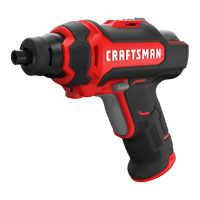
